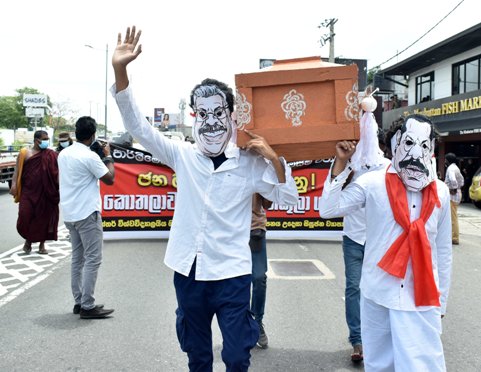Parliament will not debate controversial defence university bill this week

COLOMBO – The controversial Kotelawala National Defence University (KNDU) bill will not be debated in Sri Lanka’s Parliament this Friday (6), Minister Chamal Rajapaksa said.
Responding to a question by the former prime minister and United National Party (UNP) MP Ranil Wickremesinghe in Parliament Wednesday (4), Rajapaksa asked for more time to present the bill.
“I will not be presenting it that day as I believe MPs and the public should be given more time to express their views [on the bill],” the minister said.
Opposition leader Sajith Premadasa, meanwhile, called for a complete cancellation of the bill, and requested the government to start from scratch, holding discussions with all stakeholders.
The KNDU bill has been controversial for a number of reasons, chief among which is allegations that it will lead to the militarization of higher education.
The General Sir John Kotalawela University came into being under a UNP government in 1980 as a part of an armed forces modernization scheme. The University was established by the Military Academy Act of 1981 and the amending Acts of 1988 and 2007. Section 128 exempts the KNDU from Section 123 of the Universities Act. In 2012 fee-paying students were admitted to the University.
The controversial South Asia Institute of Technology and Medicine (SAITM) was incorporated into the KNDU in 2017.
The current bill was first presented in 2018 under the United National Party (UNP)-led Yahapalana government. The current government under President Gotabaya Rajapaksa brought in the bill again in July for a second reading.
Sri Lanka’s opposition parties including the main opposition Samagi Jana Balawegaya (SJB), which broke away from the UNP, the UNP itself, and the leftist Janatha Vimukthi Peramuna (JVP)-led National People’s Power (NPP) have said the bill, if passed, could remove the KNDU from the purview of the ministry of education and the University Grants Commission (UGC) and be brought entirely under the purview of the ministry of defence.
As per Clause 18 of the bill, the Board of Governors of the KNDU will be appointed by the Minister of Defence and will consist of nine members. This includes the Secretary and Additional Secretary to the Ministry of Defence, one nominee each from the UGC and the Treasury, the Chief of Defence Staff, the Commanders of the Army, Navy and Air Force, and the Vice-Chancellor of the University who will be a military officer.
Clause seven of the bill states: Where the [defence] minister is of the view that any situation prevailing in the university is likely to endanger national security or is detrimental or prejudicial to national policy or is likely to disrupt the smooth functioning of the University, he may direct the board of governors to take all such steps as he may deem necessary, to bring such situation under control.
Clause five (o) of the bill states: “The University shall, subject to the provisions of this act, have the power to establish campuses, colleges, faculties, departments, centres, academic institutions and such other specialized institutes, schools and divisions as may be required by the University.”
Sri Lanka’s leftist parties have historically been opposed to privatizing education.
-economynext.com

